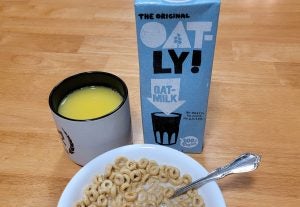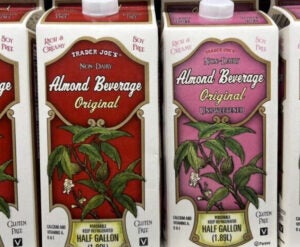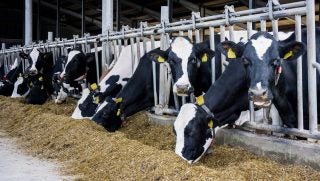Got milk? The question takes on a renewed poignancy in a world where plant-based “milk” products are sold alongside actual dairy products. Instead of offering a simple negative or affirmative, someone answering the question probably needs clarification. What is milk?
How we define milk — and whether anyone cares — has created controversy in the “milk” space for over five years now. Believe it or not, the U.S. Food and Drug Administration does have regulations that specifically define it as “the lacteal secretion, practically free from colostrum, obtained by the complete milking of one or more healthy cows.”
But as you may have noticed, the agency generally hasn’t seemed to care if plant-based products call themselves milk.

The dairy industry has begged the FDA to enforce those definitions for product labeling. In February of this year, the FDA published draft guidance for labeling of milk alternatives and nutrition statements. The FDA found that plant-based products aren’t milk. But most consumers understand that. So even if the product includes the term “milk,” no one is confused by this. That said, the FDA recommends that plant-based products should indicate the plant from which it is derived. And they should clearly indicate where its nutritional content varies significantly from dairy milk.
The public comment period ended on July 31. It’s now in the FDA’s discretion as to whether they’ll implement the guidance, or continue to do nothing. Either way, most companies tend to adopt draft guidance, if only so their products will comply if the FDA takes a stand.
So where do things currently stand? The National Milk Producers Federation has a satisfyingly snarky summary of the top plant-based alternatives. As the NMPF points out, Trader Joes is doing things the “right” way by referring to its plant-based product as “almond beverage.” Frankly, I’m a little disappointed in the lack of creativity — is beverage the best you can do?

I wonder if all of this is a little bit silly now. I first wrote about this issue back in 2017 when 32 Congressmen urged the FDA to take some action and provide some clarity. But nothing ever happened. And as the FDA discovered while drafting the guidance, most people have already figured out that milk alternatives aren’t actually milk.
The only relevant question is whether consumers realize that these products aren’t nutritionally equivalent.
But I think this draft guidance is a decent compromise. The product must clearly state the source of the product. It also needs to clearly present the nutritional differences with actual milk. Those non-binding regulations address the concerns short of banning the word “milk” on these products. Why not insist on that? Because that ship sailed … a long time ago.
That brings up another consideration: Is the FDA responsive enough to changes in the market? In our fast-paced world of 24-hour news and rapid technological process, it seems like government and regulations move at a snail’s pace. If you want proof, consider that Congress is still trying to figure out whether it should regulate social media — a phenomenon that went mainstream almost 20 years ago. I’m not suggesting we ditch the agency or scrap the rules, yet I wonder if FDA’s review could be more streamlined.
Ponder it.
In the meantime, I’m just glad no one wants us to call these plant-based alternatives “nut juice.”
Amanda Zaluckyj blogs under the name The Farmer’s Daughter USA. Her goal is to promote farmers and tackle the misinformation swirling around the U.S. food industry.



